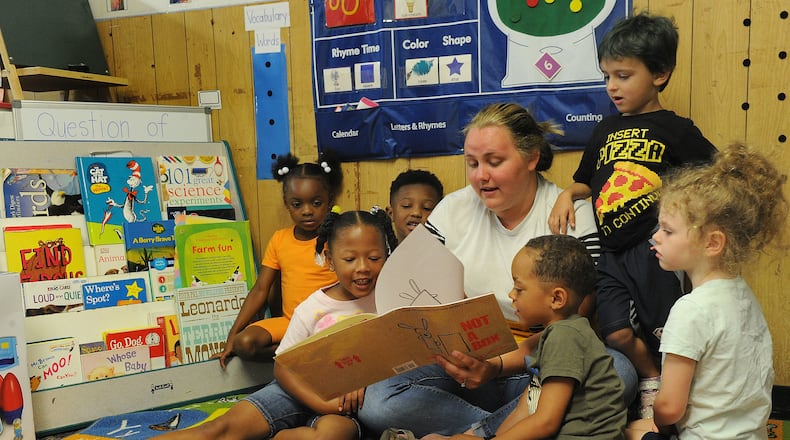“We’re excited to be able to help Dayton families with 3-year-olds find and afford high-quality preschools,” Preschool Promise executive director Robyn Lightcap said. “(Families) are now able to enroll their 3-year-olds and receive all of Preschool Promise’s benefits, including tuition assistance, free monthly Play Boxes to keep children learning at home, free books-of-the-month and more.”
The agency, funded by Montgomery County, the city of Dayton and local philanthropists, aims to help more families afford preschool through tuition assistance. They also help the schools and child care centers increase their educational quality, via training and coaching.
According to years of local data, more kids in low-income communities are academically behind by the time they even step into a kindergarten class, and many struggle to catch up. For two straight years, Preschool Promise data has shown that their students in Dayton and Kettering were significantly more likely to score well on the state’s Kindergarten Readiness Assessment than non-PP kids.
The expansion for 3-year-olds is open to those within the Dayton Public Schools geography. Funding for Preschool Promise students in Dayton comes from the income tax increase that voters approved in 2016.
Lightcap said Preschool Promise has accumulated a balance for Dayton of about $3 million since its initial implementation year of 2017-18. Those funds will cover the estimated $750,000 per year expansion to 3-year-olds.
“It’s such an important time, coming off COVID,” Lightcap said. “So many families struggled with what to do with their young children during the pandemic, and they’re worried about their children’s learning and readiness as they go to kindergarten.”
Lightcap and Dayton Mayor Nan Whaley both said expanding services to 3-year-olds has been a goal from the start.
“I’m thrilled we’re able to achieve that even sooner than expected,” Whaley said. “We know that early learning is critical for kids to thrive later in life, and I continue to be so proud of Dayton’s commitment to making that a reality for all of our young people.”
Countywide, Preschool Promise is up to 101 affiliated schools and centers, with 92% of them at three stars or higher in the state’s five-star Step Up to Quality system.
Kim Jarvis, director of the five-star On Purpose Academy in Dayton, said her center already connects 4-year-olds with Preschool Promise services, and she called the expansion to her younger children “amazing” on multiple fronts.
First is getting the monthly home deliveries of books and “play boxes” that include educational supplies and crafts that kids can do with family members, while following along with a Preschool Promise video.
“They get play boxes every month with activities for the parents to engage with their kids,” Jarvis said. “We ask them, ‘Can you send us pictures of what you’re doing with it?’ and that helps with our family engagement. … They really look for it in the mail.”
Jarvis said it’s also a huge advantage to have the teachers of her younger students eligible for Preschool Promise’s training opportunities and “professional learning communities,” where teachers learn with peers around the region and dive deeper into classroom topics.
“This means we have more highly trained, highly qualified teachers who can serve better and are stronger in the classroom,” Jarvis said.
** West Carrollton: Preschool Promise started in Dayton and Kettering, but with the expansion to West Carrollton, the agency now serves seven of Montgomery County’s 16 school districts. Funding for efforts outside the city of Dayton come primarily from county government.
The 150 seats available in West Carrollton follow on the heels of expansion to Jefferson Twp., Mad River, Northridge and Trotwood-Madison. Families can search for preschools or apply at preschoolpromise.org.
** Major donation: Preschool Promise received $715,000 from an anonymous donor, specifically focused on increasing the number of black teachers with a degree or credential in early childhood education.
Lightcap said the money will mainly pay for scholarships and other assistance to eliminate barriers to debt-free degrees. That could include help filing out college applications or financial aid forms, as well as placement test prep for adult teachers going back to school.
About the Author

